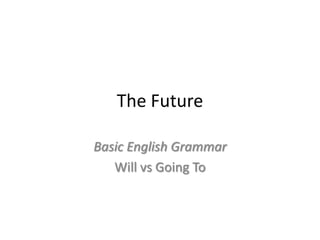
Future will going_to
- 1. The Future Basic English Grammar Will vs Going To
- 2. Simple Future Se utiliza fundamentalmente: • Cuando se toma una decisión repentina en el momento en que se está hablando: – I’ve got a headache, I’ll take an aspirin. Me duele la cabeza, voy a tomarme una aspirina. • Para hacer predicciones sobre hechos futuros: – They’ll be very happy together. Serán muy felices juntos. – se prevé. • Para pedir y ofrecer ayudar. – Will you lay the table? ¿quieres poner la mesa? – I’ll carry your case. Te llevo la maleta.
- 4. Forma afirmativa • Se forma con el Sujeto + will + base del verbo – He will(he’ll) be your friend. • Será tu amigo. – You will (you’ll) see him • Lo verás.
- 5. Forma negativa • Sujeto + won’t (=will not) + base del verbo – He won’t be your friend. • No será tu amigo. – You won’t see him. • No lo verás.
- 6. Forma interrogativa • Will + sujeto + forma base del verbo? – Will he be your friend? • ¿Será tu amigo? – Will you see him? • ¿Lo verás?
- 7. El Futuro con be going to Se utiliza fundamentalmente para: • Hablar de intenciones o planes en un futuro próximo: – I’m going to eat. Voy a comer. • Indicar que algo va a ocurrir inmediatamente: – Look at the sky. It’s going to rain! Mira el cielo. ¡Va a llover! • – todo lo indica • Que algo va a suceder con seguridad en un futuro próximo: – She’s going to have a baby. Va a tener un bebé –está embarazada
- 8. To be going to I’m going to visit my family
- 9. Forma afirmativa Sujeto + presente del to be + going to + base del verbo. – I am going to meet some friends at the weekend. • Voy a quedar con unos amigos el fin de semana
- 10. Forma negativa sujeto + presente del vb to be + not + going to + base del verbo – I am not going to study this weekend. • No voy a estudiar este fin de semana
- 11. Forma interrogativa Presente del vb to be + sujeto + going to + base del verbo – Are you going to meet your boyfriend this weekend? • Vas a quedar con tu novio el fin de semana?